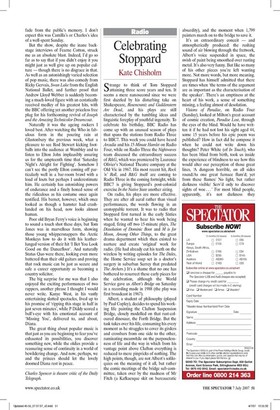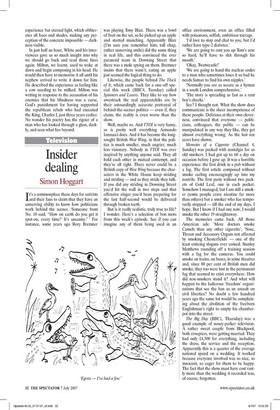Celebrating Stoppard
Kate Chisholm Strange to think of Tom Stoppard attaining three score years and ten. It seems a mere nanosecond since we were first dazzled by his disturbing take on Shakespeare, Rosencrantz and Guildenstem Are Dead, and his plays are still characterised by the tumbling ideas and linguistic foreplay of youthful ingenuity. To celebrate his birthday, BBC Radio has come up with an unusual season of plays that spans the stations from Radio Three to BBC7. This week you could have heard Arcadia and his 15-Minute Hamlet on Radio Four, while on Radio Three the Nigh/waves team discussed the extraordinary success of R&G, which was premiered by Laurence Olivier's National Theatre company at the Old Vic in 1967. His most recent hit, Rock 'n' Roll, and R&G itself are coming to Radio Three in the coming fortnight, while BBC7 is giving Stoppard's post-colonial exercise In the Native State another airing.
On radio, his plays are more effective. They are after all aural rather than visual performances, the words flowing in an unstoppable torrent. It was to radio that Stoppard first turned in the early Sixties when he wanted to hear his work being staged, firing off two 15-minute plays, The Dissolution of Dominic Boot and M is for Moon, Among Other Things, to the great drama department which then existed to nurture and create 'original' work for radio. (He had already cut his teeth on the wireless by writing episodes for The Dales, the Home Service soap set in a doctor's surgery in suburban Surrey that predated The Archers.) It's a shame that no one has bothered to resurrect these early pieces for the celebration, although the World Service gave us Albert's Bridge on Saturday in a recording made in 1988 (the play was first broadcast in 1967).
Albert, a student of philosophy (played by Paul Copley), decides to spend his working life painting the Clufton Suspension Bridge, closely modelled on that rust-coloured dinosaur, the Forth Bridge. But the task takes over his life, consuming his every moment as he struggles to cover its girders and crossbars from one side to the other, ruminating meanwhile on the purposelessness of life and the way in which from his vantage point above Clufton everything is reduced to mere pinpricks of nothing. The high points, though, are not Albert's soliloquies on the meaning of it all, but rather the comic meetings of the bridge sub-committee, taken over by the madness of Mr Fitch (a Kafkaesque skit on bureaucratic absurdity), and the moment when 1,799 painters march on to the bridge to save it.
It's an extraordinary conceit — and atmospherically produced: the rushing sound of air blowing through the fretwork, Albert's voice suspended in space, the swish of paint being smoothed over rusting metal. It's also very funny. But like so many of his other pieces you're left wanting more. Not more words, but more meaning. Stoppard has himself admitted that there are times when `the terms of the argument are as important as the characterisation of the speaker'. There's an emptiness at the heart of his work, a sense of something missing, a feeling almost of desolation.
Visions of Paradise, on Radio Four (Sunday), looked at Milton's great account of cosmic creation, Paradise Lost, through the eyes of the blind. Would he have written it if he had not lost his sight aged 44, some 15 years before his epic poem was published? How in fact did he compose it when he could not write down his thoughts? Peter White (of In Touch), who has been blind from birth, took us inside the experience of blindness to see how this would alter our perception of those great lines, 'A dungeon horrible, on all sides round/As one great furnace flam'd; yet from these flames/ No light, but rather darkness visible/ Sery'd only to discover sights of woe ... ' For most blind people, apparently, it's not darkness they experience but eternal light, which obliterates all hues and shades, making any perception of the concrete impossible — darkness visible.
In just half an hour, White and his interviewees gave us so much insight into why we should go back and read those lines again. Milton, we learnt, used to wake at dawn and begin composing in his head. He would then have to memorise it all until his nephew arrived to write it down for him He described the experience as feeling like a cow needing to be milked Milton was writing in response to the accusation of his enemies that his blindness was a curse, God's punishment for having supported the republican rebels who had executed the King, Charles I, just three years earlier. No wonder his poetry has the rigour of a man who has looked through a glass, darkly, and seen what lies beyond.




















































 Previous page
Previous page